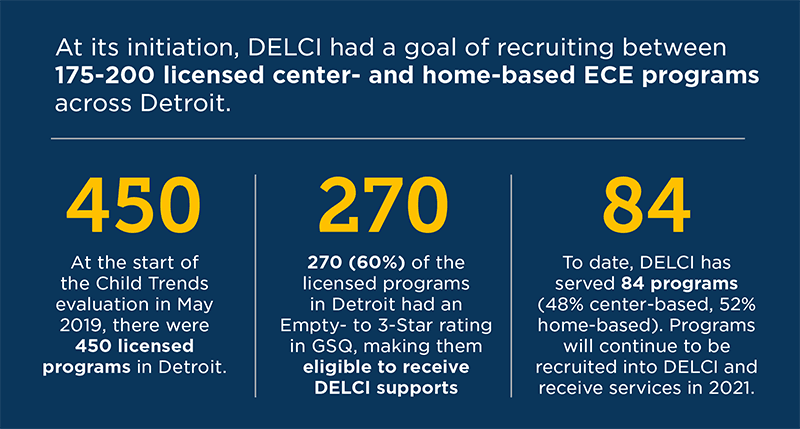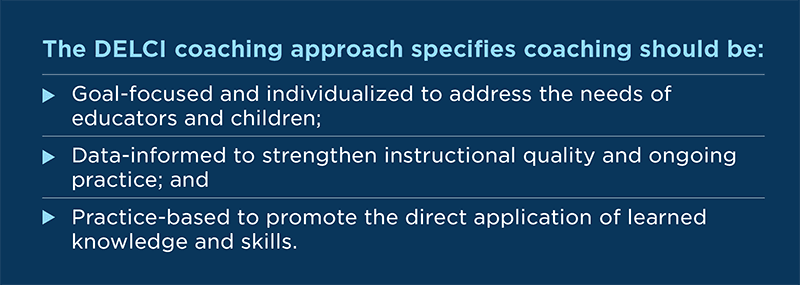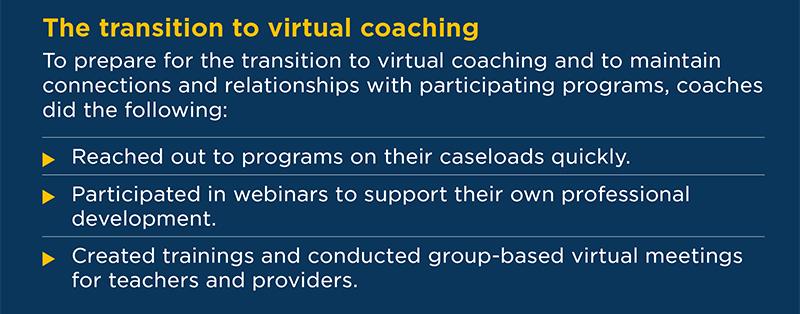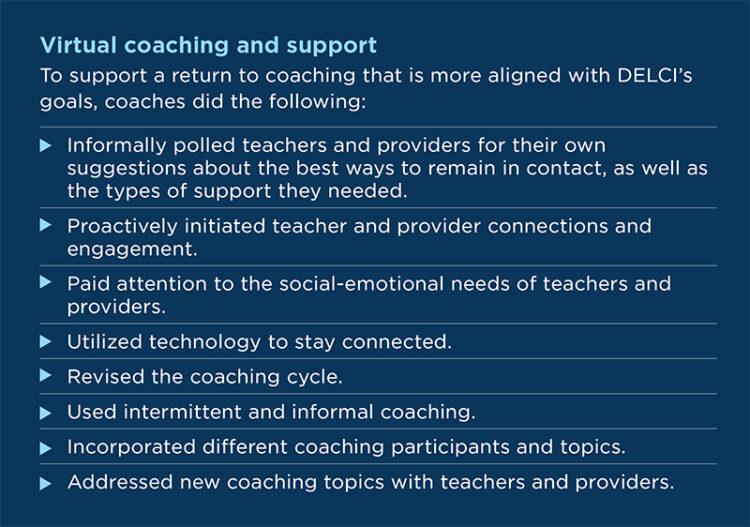Virtual Coaching to Support Early Care and Education Programs during COVID-19
In response to executive order mandates from states and governors, many early care and education (ECE) settings closed or transitioned to providing virtual services to children and families during the COVID-19 pandemic. For ECE coaches, these closures resulted in the need for rapid adjustments in the way they provided coaching services. These adjustments occurred with little time to prepare and minimal knowledge of how best to understand ECE program needs, structure coaching sessions, develop and implement coaching content, or assess the progress of teachers and providers in a virtual context.
This two-part series of briefs gives an overview of the process and lessons learned during the transition from in-person to virtual coaching for the Detroit Early Learning Coaching Initiative (DELCI). This brief, the first in the series, presents an overview of DELCI, including a summary of the coaching model, the process of adapting it to a virtual format during COVID-19, and initial experiences with virtual coaching implementation. The second brief in the series will describe how virtual coaching was implemented over time, including lessons learned.
Download
Methodology
In May 2019, Child Trends contracted with the Early Childhood Investment Corporation (ECIC) to evaluate DELCI. Evaluation activities to date include a literature scan focused on coaching and professional development in ECE settings, interviews and focus groups with DELCI coaches and program staff, observations of DELCI coaches working with participants (in-person and via video), online surveys taken by DELCI participants, analyses of administrative data from ECIC, and meetings with stakeholders and community members in Detroit.
Overview of DELCI
Through funding support from the W.K. Kellogg Foundation as part of the Hope Starts Here Initiative, DELCI was launched in 2018 with two primary goals: 1) to improve the quality of ECE programs in Detroit; and 2) to engage ECE programs in Great Start to Quality (GSQ)—Michigan’s quality rating and improvement system. Programs who choose to participate in the GSQ rating process are rated on a one- to five-Star scale. Licensed programs and providers who are not participating in GSQ still have a program profile in the GSQ system and appear as an Empty Star.
The DELCI approach
The levers of change for the DELCI approach include providing instructional coaching (primarily to center-based teachers and home-based child care providers) and state-approved curriculum and assessment resources to ECE programs. These levers were intentionally designed to address data from GSQ that showed lower rated programs were often unable to achieve higher ratings because they did not have access to or know how to use state-approved curriculum and assessments. In DELCI, instructional coaching and curriculum and assessment resources are seen as a way to strengthen teaching practices and, as an extension, strengthen program quality and child outcomes.
At its initiation, DELCI had a goal of recruiting between 175-200 licensed center- and home-based ECE programs across Detroit. Special attention was given to recruiting:
- Programs who were not currently participating in GSQ;
- Programs who were participating in GSQ but who had lower quality ratings (i.e., below a 3-Star); and
- Programs who had instructional support needs or who wanted support using curriculum and/or assessment tools.
At the start of the Child Trends evaluation in May 2019, there were 450 licensed programs in Detroit. Of these, 60 percent (270) had an Empty- to 3-Star rating in GSQ, making them eligible to receive DELCI supports. To date, DELCI has served 84 programs (48% center-based, 52% home-based). Programs will continue to be recruited into DELCI and receive services in 2021.

DELCI coaching
The DELCI coaching approach draws heavily on the locally developed Early Educators Excel Coach-Based Adaptive Learning model, also known as E3. Coaching in DELCI is instructional in nature, with coaches working closely with ECE teachers and providers to support their use of language and literacy development strategies with children. The approach specifies coaching should be:
- Goal-focused and individualized to address the needs of educators and children;
- Data-informed to strengthen instructional quality and ongoing practice; and
- Practice-based to promote the direct application of learned knowledge and skills.

Coaching on the ground
DELCI coaches do not use a set coaching curriculum, but instead draw on specific strategies from the E3 coaching model to guide their interactions with participants. While DELCI coaching evolves based on what coaches learn during the process of implementation, the research-informed E3 strategies they draw on are constant. These “on-stage” or in-context strategies include:
- Modeling (e.g., “I do, you watch”);
- Side-by-side coaching (e.g., “I do, you help”);
- Cue-coaching (e.g., “you do, I help”); and
- In-the-moment feedback (e.g., the coach provides feedback to participants while they are actively engaged in interactions with children).
DELCI coaching also incorporates the use of “off-stage” supports, where coaches follow up with teachers and providers via email, phone, or text, depending on individual preferences.
In addition to specific strategies, coaching sessions follow a similar format:
- An initial conditions assessment where coaches determine whether the timing is right to actively engage the teacher or provider
- Establishing a shared understanding of outlook and outcome (e.g., “setting the stage”)
- Using coaching strategies (e.g., modeling, side-by-side, cueing)
- Dedicating time for teachers or providers to practice skills and receive in-the-moment feedback
- Collaborating on decision-making between coaches, teachers, and providers regarding next steps
Coaches also use the Classroom Assessment Scoring System (CLASS) tool to conduct teacher and provider observations.[1] Participants receive a formal (center-based teachers) or informal (home-based providers) CLASS observation at the beginning of the coaching support process. Coaches also make a documented determination about how confident they are regarding the progress that programs are making toward their pre-determined goals, including CLASS indicators. CLASS is the primary structured tool used in classrooms and homes; the scores and coach confidence ratings are used to monitor progress and set quality improvement goals.
Participation in DELCI coaching is individualized based on the preferences and need of each program. As such, the frequency of coaching sessions varies. In general, however, the DELCI coaching model was designed to be more intensive upfront, with teachers and providers receiving weekly coaching during the initial months of the initiative. Coaching interactions phase out over time as programs demonstrate progress and proficiency in the core practices.
DELCI Coaching since COVID-19
Along with many other states, Michigan issued a series of statewide orders starting in March 2020 to reduce the exposure and spread of COVID-19 infection to residents. Executive Order #21, which went into effect on March 23 and suspended “all activities not critical to sustain or protect life,” ordered all ECE programs to close unless they were serving the children of essential workers.[2] This resulted in a reduction in the number of staff, children, and families involved with ECE programs across the state. In June 2020, Executive Order #114[3] allowed ECE programs, along with many other businesses, to reopen with specific health and safety protocols in place.
On an ongoing statewide survey administered by ECIC, over 80 percent of licensed ECE programs who responded reported that they were open as of the end of November 2020.[4] Home-based child care programs were more likely to be up and running: 91 percent, compared to 75 percent of center-based programs. In Detroit specifically, the overall numbers were lower, with only 55% of programs indicating they were open.
The transition to virtual coaching
In response to COVID-19 and ECE program closures, DELCI coaches have been working closely with their supervisors to adapt to the provision of virtual coaching. The speed at which coaches have had to transition is unprecedented, with coaches moving to provide services virtually almost immediately after Executive Order 21 went into effect. Key in this shift has been a consideration not only of the intended coaching goals and objectives, but also of the needs, availability, motivation, and receptivity of teachers and providers. To prepare for the transition to virtual coaching and to maintain connections and relationships with participating programs:
Coaches reached out to programs on their caseloads quickly.
Coaches connected with almost every program on their caseload during their initial outreach efforts. They learned that programs needed immediate support related to operational and administrative challenges. During subsequent conversations, administrators, teachers, and providers expressed feeling anxious, fatigued, stressed, fearful, and uncertain about how to provide services. In some cases, they also lacked clear guidance about how to move forward. Coaches fielded questions and directed administrators, teachers, and providers to resources and funding opportunities related to COVID-19. These conversations provided an opportunity for coaches to reflect on the type of support they generally offered compared to the issues and types of needs that were arising. This learning set the stage for subsequent virtual coaching activities with programs participating in DELCI.
Coaches participated in webinars to support their own professional development.
In addition to ongoing supervision, coaches actively searched for and participated in online professional development activities to become better informed about the resources available to programs, as well as to strengthen their own ability to provide virtual coaching.
Coaches created trainings and conducted group-based virtual meetings for teachers and providers.
Coaches noted that in addition to lacking information about how to operate programs and best serve families and children during COVID-19, some teachers and providers also felt isolated and were interested in communicating with their peers. Coaches responded to this need by developing and conducting virtual trainings and hosting online meetings. Coaches noted that both types of activities were appreciated and well attended. The trainings, however, were less interactive than a typical coaching session; exchanges with teachers and providers focused primarily on the provision of information from coaches, versus engaging in reflective, bidirectional conversations between coaches, teachers, and providers.
Related Content
- Considerations for Building Post-COVID Early Care and Education Systems that Serve Children with Disabilities
- Strategies to Virtually Support and Engage Families of Young Children during COVID-19 (and Beyond)
- Parent Aware: Perceptions of the Building Quality Relationship-Based Coaching Model
- Lessons Learned from Virtual Early Care and Education Coaching During COVID-19

Virtual coaching and support
Adapting coaching activities from a classroom or home to an online environment is a challenge. To support a return to coaching that is more aligned with DELCI’s goals:
- Coaches informally polled teachers and providers for their own suggestions about the best ways to remain in contact, as well as the types of support they needed. This strategy was designed to help them feel included in the process of rethinking coaching.
Other refinements or adaptations to the format and content of the coaching approach include:
Proactively initiating teacher and provider connections and engagement.
Anticipating that returning teachers and providers might have questions or need extra support, coaches have continued to regularly update them using various modalities (e.g., email, text, phone, and social media) to ensure they are well-informed and connected to the Initiative.
Paying attention to the social-emotional needs of teachers and providers.
Coaches shared that most of their communication with programs prior to COVID-19 focused on children and the learning environment. Since March 2020, coaches report spending more time supporting the social and emotional needs of teachers and providers. This includes consideration of the type of supports and resources they need, as well as working to address any fears or concerns they might have related to the pandemic and its impact on their communities and businesses.
Utilizing technology to stay connected.
COVID-19 has not only shifted the conversations and activities that coaches are engaging in, but it has also provided an opportunity to focus on ways to maximize technology and digital connections. As an example, DELCI coaches, teachers, and providers have adopted and are becoming proficient with TORSH Talent, an online video platform, which is ushering DELCI coaching into a new era of virtual pedagogy. As mentioned previously, coaches have also created opportunities for peer-to-peer learning and networking via social network platforms like Facebook. These channels have opened the door for teachers and providers to connect in ways that did not happen pre-COVID-19, including talking about their new normal, collaborating with colleagues, and problem-solving challenges in a supportive virtual community.
Revising the coaching cycle.
Before COVID-19, DELCI coaching typically involved a series of activities such as coaching conversations, modeling, co-teaching, and classroom collaboration. While these types of in-person exchanges are currently not possible, coaches are partnering with teachers and providers to observe and provide feedback on their classroom practices virtually. For example, teachers are co-planning with coaches about the types of activities that will be videotaped, uploading videos, and reviewing coach feedback. Teachers, providers, and coaches are doing more planning and preparation while classroom interactions occur without the coach present.
Using intermittent and informal coaching.
To quickly share a resource or schedule a meeting, coaches are reaching out to teachers and providers on a more ad-hoc basis to connect with them outside of formal coaching meetings.
Additional ways to support the ongoing needs of programs include:
Incorporating different coaching participants and topics.
Coaches noted that ECE programs have significant resource needs related to COVID-19. For example, many program administrators needed to locate and access resources, such as cleaning supplies or personal protective equipment (PPE), to ensure their settings could remain operational. In center-based programs, coaches initially shifted their interactions from working primarily with teachers to working more closely with program directors. In home-based child care programs, conversations shifted from instructional content to administrative topics.
Addressing new coaching topics with teachers and providers.
Prior to COVID-19, coaches spent the bulk of their time coaching on instructional practices and/or the implementation of curriculum and assessment tools. Since the start of COVID-19 in early 2020, coaches report having conversations about reopening, including staffing, scheduling, PPE use, sick policies, and health practices. Center-based settings in particular have been experiencing personnel shortages, with some directors filling in as teachers in classrooms. Many K-12 schools in Michigan currently remain closed, with students attending school remotely. Some of these students are being supervised in ECE settings and some teachers and providers have shared concerns with coaches about being able to support school-age children or help with online learning. Coaches are responding to requests for information and consultation from program directors, teachers, and providers about these topics.

In general, coaches noted that the initial uptake for virtual coaching was slow when it was first offered. However, as it has become more evident that ECE program changes resulting from COVID-19 will be longer-term, interest and uptake has continued to increase.
Conclusion
The COVID-19 pandemic has brought new challenges and opportunities for growth in coaching. One key difference is that coaches are spending more time with center-based program directors and home-based child care programs on administrative issues. In addition, because teachers and providers are no longer able to visit each other’s classrooms or homes to learn and socialize together, online tools have been used to foster connections and peer learning. Finally, changes have also occurred to the coaching process. Core activities like modeling, co-teaching, and in-the-moment feedback between coaches, teachers, and providers are not currently happening, but teachers and providers are taking a more active role within the coaching process to identify the activities they would like to focus on. In short, coaching looks and feels different: the process and content of coaching has changed and so have the coaching recipients. The second brief in this series will explore the evolution of the changes in DELCI coaching over time, shedding light on lessons learned from virtual coaching initiation.
Download
References
[1] The CLASS tool measures the quality of teacher-child interactions and is correlated to educational outcomes for preschool age children. CLASS has not been designed for use in home-based settings.
[2] Exec. Order No. 2020-21: “Temporary requirement to suspend activities that are not necessary to sustain or protect life.” (March 24, 2020). https://www.michigan.gov/whitmer/0,9309,7-387-90499_90705-522626–,00.html
[3] Exec. Order No. 2020-114: “Safeguards to protect Michigan’s workers from COVID-19.” (June 5, 2020). https://www.michigan.gov/whitmer/0,9309,7-387-90499_90705-531123–,00.html
[4] Early Childhood Investment Corporation (2020, November 30). How many child care providers are open in Michigan? https://www.ecic4kids.org/child-care-status-survey-data/
© Copyright 2025 ChildTrendsPrivacy Statement
Newsletter SignupLinkedInYouTubeBlueskyInstagram

